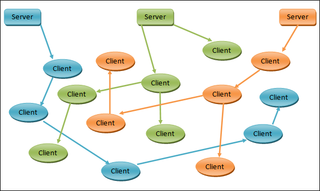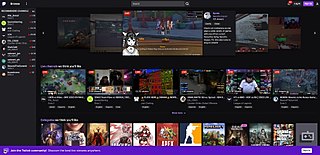Video on demand (VOD) is a media distribution system that allows users to access videos, television shows and films digitally on request. These multimedia are accessed without a traditional video playback device and a typical static broadcasting schedule, which was popular under traditional broadcast programming, instead involving newer modes of content consumption that have risen as Internet and IPTV technologies have become prominent, and culminated in the arrival of VOD and over-the-top (OTT) media services on televisions and personal computers.

Yahoo! Messenger was an advertisement-supported instant messaging client and associated protocol provided by Yahoo!. Yahoo! Messenger was provided free of charge and could be downloaded and used with a generic "Yahoo ID" which also allowed access to other Yahoo! services, such as Yahoo! Mail. The service also offered VoIP, file transfers, webcam hosting, a text messaging service, and chat rooms in various categories.
A digital video recorder (DVR), also referred to as a personal video recorder (PVR) particularly in Canada and British English, is an electronic device that records video in a digital format to a disk drive, USB flash drive, SD memory card, SSD or other local or networked mass storage device. The term includes set-top boxes (STB) with direct to disk recording, portable media players and TV gateways with recording capability, and digital camcorders. Personal computers are often connected to video capture devices and used as DVRs; in such cases the application software used to record video is an integral part of the DVR. Many DVRs are classified as consumer electronic devices. Similar small devices with built-in displays and SSD support may be used for professional film or video production, as these recorders often do not have the limitations that built-in recorders in cameras have, offering wider codec support, the removal of recording time limitations and higher bitrates.
Streaming television is the digital distribution of television content, such as television series and films, streamed over the Internet. Standing in contrast to dedicated terrestrial television delivered by over-the-air aerial systems, cable television, and/or satellite television systems, streaming television is provided as over-the-top media (OTT), or as Internet Protocol television (IPTV). In the United States, streaming television has become "the dominant form of TV viewing."

Xfire was a proprietary freeware instant messaging service for gamers that also served as a game server browser with various other features. It was available for Microsoft Windows. Xfire was originally developed by Ultimate Arena based in Menlo Park, California.

BBC iPlayer is a video on demand service from the BBC. The service is available on a wide range of devices, including mobile phones and tablets, personal computers and smart televisions. iPlayer services delivered to UK-based viewers feature no commercial advertising. The terms BBC iPlayer, iPlayer, and BBC Media Player refer to various methods of viewing or listening to the same content. To use the service, a valid TV Licence is required by law.

P2PTV refers to peer-to-peer (P2P) software applications designed to redistribute video streams in real time on a P2P network; the distributed video streams are typically TV channels from all over the world but may also come from other sources. The draw to these applications is significant because they have the potential to make any TV channel globally available by any individual feeding the stream into the network where each peer joining to watch the video is a relay to other peer viewers, allowing a scalable distribution among a large audience with no incremental cost for the source.

The company Yahoo! ran several similar video services. Yahoo! Video, a video hosting service, was established in 2006. Later, the ability to upload videos was removed, changing it to a more pure video on demand service; the website became a portal for curated video content hosted by Yahoo's properties. In 2011, the service was re-launched as Yahoo! Screen, placing a larger focus on original content and web series. Created for the service were the series Burning Love, Electric City, Ghost Ghirls, Losing It with John Stamos, Sin City Saints, and Other Space. Yahoo! Screen also acquired the sitcom Community for an additional season, following its cancellation after the fifth season on NBC. In January 2016, following a $42 million write-down on the poor performance of its original content, Yahoo! Screen was shut down. In August 2016, Yahoo! announced a partnership with the subscription video-on-demand service Hulu to move its free video library to a de facto successor known as Yahoo! View. Yahoo! View streamed recent episodes of television series from the ABC, NBC, and Fox networks in the United States, as well as a moderate selection of archived programs from various distributors, the "skinny bundle" model. Yahoo! View was decommissioned on June 30, 2019.

Stickam was a live-streaming video website that launched in 2005. Stickam featured user-submitted pictures, audio, video, and most prominently, live streaming video chat. The site quickly expanded to include live shows and produced content from MTV, G4 TV, CBS Radio, NATPE, CES, and many others, as well as live performances and shows with numerous musicians and celebrities.
Justin.tv was a website created by Justin Kan, Emmett Shear, Michael Seibel, and Kyle Vogt in 2007 to allow anyone to broadcast video online. Justin.tv user accounts were called "channels", like those on YouTube, and users were encouraged to broadcast a wide variety of user-generated live video content, called "broadcasts".

Lifestreaming is an act of documenting and sharing aspects of one's daily experiences online, via a lifestream website that publishes things of a person's choosing.
Social viewing describes a recently developed practice revolving around the ability for multiple users to aggregate from multiple sources and view online videos together in a synchronized viewing experience.

Bebo was an American social networking website that originally operated from 2005 until its bankruptcy in 2013 and relaunched in February 2021. The site relaunched several times after its bankruptcy with a number of short-lived offerings, including instant messaging and video streaming, until its acquisition by Amazon in July 2019 when it was shut down. It was announced in January 2021 that it would be returning as a new social-media site the month after. By May 2022, it had once again been shut down, without having ever left beta-testing.

Livestreaming, live-streaming, or live streaming is the streaming of video or audio in real time or near real time. While often referred to simply as streaming, the real time nature of livestreaming differentiates it from other forms of streamed media, such as video-on-demand, vlogs, and YouTube videos.

Twitch is an American video live-streaming service that focuses on video game live streaming, including broadcasts of esports competitions, in addition to offering music broadcasts, creative content, and "in real life" streams. Twitch is operated by Twitch Interactive, a subsidiary of Amazon. It was introduced in June 2011 as a spin-off of the general-interest streaming platform Justin.tv. Content on the site can be viewed either live or via video on demand. The games shown on Twitch's current homepage are listed according to audience preference and include genres such as real-time strategy games (RTS), fighting games, racing games, and first-person shooters.
An online video platform (OVP) enables users to upload, convert, store, and play back video content on the Internet, often via a private server structured, large-scale system that may generate revenue. Users will generally upload video content via the hosting service's website, mobile or desktop application, or other interfaces (API), and typically provides embed codes or links that allow others to view the video content.

Periscope was an American live video streaming app for Android and iOS developed by Kayvon Beykpour and Joe Bernstein and acquired by Twitter, Inc. before its launch in March 2015.

YouNow is an American live streaming broadcasting service where users stream their own live video content or interact with the video streams of other users in real time. The service is available on its website and on Android and iOS apps.

BlogTV was a live-streaming video blog service reintroduced by MadCow Disease Media LLC, in January 2016. BlogTV was first established in Ramat Gan, Israel in January 2004 by founders Ilan Ben-Dov, Dan Chen, Guy Eliav, Nir Ofir, and Oren Levy as a webcasting company. The service operated under the Tapuz brand. BlogTV's goals were to provide a means for anyone with Internet access to express their talents and ideas to the world. In 2006 BlogTV launched its Canadian activity under the name BlogTV.ca. BlogTV.com was officially launched in June 2007 in the US and the rest of the world. Users could create live video shows, interact with their audiences or invite co-hosts to join their show over the internet or by using WAP. The broadcasters were able to broadcast to their audience with a webcam. The platform also included a chat system. The site had a promotional partnership with ICQ, an IM platform. YouNow acquired BlogTV.com on March 13, 2013.













